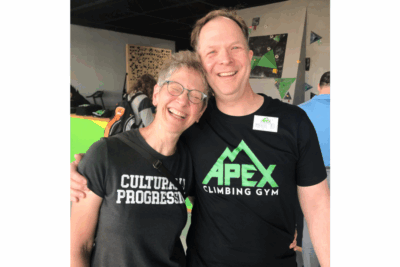Placido Rodríguez begins his work day at Patrick Industries, a recreational vehicle company in Bremen, well before sunrise.
He drives from his home in Elkhart to stack drywall and wood panels, hour after hour, working to give his family a better life.“I work a 10-hour shift with one 15-minute break and a half-hour lunch break,” Placido Rodríguez said, “I have to wake up at 3:30 a.m., start at 5 a.m. and end at 3:45 p.m.”
Meanwhile, his son, Alejandro, is sitting in a Climate Change class at Goshen College by 9 a.m., three mornings a week. Alejandro Rodríguez, a junior, intends to be a high school teacher, working with students for whom English is a new language.
Alejandro Rodríguez appreciates all the effort that his father and his mother, Evelia Rodríguez, have expended to provide him with opportunities that they never had. His mother, too, had labored at a factory, though she currently works at home.
“They have to get up at extraordinary hours of the day and when they come home they are exhausted,” Alejandro Rodríguez said. “Sometimes I feel that I should be the one working so they don’t have to work at the factory any more. Every day when I come home and see my dad at the dinner table exhausted, I see the hard work he does for us. It makes me want to try harder in school so I can return the favor.”
Alejandro Rodríguez said that he is always aware of the differences between the first and second generations of Latino immigrants.
“The biggest difference I see between my generation and my parents’ generation is the education,” he said. “They never had the opportunity to go to school. Since they never got the opportunity, I can also see some of the small things they have missed out on like having the opportunity to be in a school club, band or sport.”
Even though he is pleased to be able to attend a private college, Alejandro Rodríguez said that he, too, faces challenges.
“My biggest difficulty would probably be the economic problems with school,” he said. “I can’t live on campus because of financial issues, and so I have to stress myself to travel from home to school. I also have to balance cross country and track with homework.”
Alejandro Rodríguez is one of the top runners at Goshen College. He finished eighth (9:25:82) in the 3,000 meter run at the Defiance College Winter Open in Ohio last month. In cross-country, he was the third Goshen runner across the line at the NAIA Great Lakes Challenge in October.
Placido Rodríguez is pleased with his son’s accomplishments.
“I am really prideful because I can see the work that my wife and I have put into his studies,” he said. “We are overall very happy to see him moving ahead.”
Placido Rodríguez came to the United States from Mexico City in 1974, arriving in California to pick grapes. Ten years later, Placido Rodríguez moved to Elkhart County.
He said, “I didn’t like the way things were going in California so I talked to one of my friends that had a son here in Elkhart County. He helped me to find a home and a job.”
Many Hispanic immigrants who move to this region rely on friends or family to find work and a place to live “That’s why people come to Elkhart County,” Placido Rodríguez said.
However, life wasn’t necessarily easy when Placido Rodríguez arrived. To add his struggles in the new place, he missed his wife, who remained in Mexico.
Placido Rodríguez said, “Whoever loves his family lived a difficult life and whoever didn’t love his family had it easier. I was always wondering what was happening back home.”
So he traveled back and forth to Mexico until his family came to Elkhart County 18 years ago, in 1995, when Alejandro Rodríguez was 3 years old.
Placido Rodríguez remembers how his first job in Elkhart County lasted only a few months because it was too far away from his house. He could not afford to commute to the job.
“I found a job close by and with the money I saved, I bought a car,” he said, “That job was hard because of the working hours; I worked early in the mornings starting at 2 a.m. so I had to wake up at 1 a.m. When I was done, I was really sleepy and I had difficulties staying awake on the road.”
Elias García, a Goshen resident who also immigrated from Mexico and now works in a factory, said, “To find a job is not easy for us, and the restrictions are getting bigger with the new immigration. Now it is harder to work because they need to verify the documents. They check more deeply than they used to do some years ago.”
Most members of the first generation of Hispanic immigrants in Goshen have been working in RV factories, like Lippert Components and Forest River.
“Most of them are working around that industrial area,” said Rocio Diaz, the multicultural outreach community liaison at Goshen College.
With the money generated from the first generation, the second Hispanic generation has an opportunity to receive higher education. Like Alejandro Rodríguez, the children of factory workers can attend college to pursue professional careers.
“You can see the new Hispanic generation working at the health centers, in schools… We now have degrees,” García said. He is a graduate student at Ivy Tech Community College.
In the U.S., Hispanics constitute about 17 percent of the total population. In Goshen, the Hispanic community represents a bigger share, at 28 percent.
Most of the Hispanics in Goshen, about 80 percent, come from Mexico. The rest have roots in Central or South America.
“In Goshen, there are people from many different places such as Mexico, Puerto Rico, Cuba, Honduras, El Salvador, Venezuela, Guatemala, Colombia, Peru and Ecuador,” Diaz said, who noted that Goshen College compiled a detailed portrait of the Latino community in the book “Latinos in North Central Indiana: A Demographic Profile.”
Diaz estimated that about three-quarters of Hispanics in recent years arrives in the country without documents, which makes their stay more difficult. One of the biggest challenges, she said, is the entry to higher education.
“My job is to inform the Hispanic population of the many opportunities they have to improve their lives through obtaining a higher education,” she said. “I try to guide both parents and sons and daughters about the benefits of studying at Goshen College. The lack of experience makes them scared of a new situation.”
“They have many possibilities but they do not have the mentality of (automatically) going to college . . . ,” Diaz said. “And that is something that has to change in the next years.”
“The other problem is the language,” Diaz says. “There are still many Hispanic people that do not know how to speak English.”
This is now changing, thanks in part to language courses offered through schools, libraries and elsewhere – and to differences in generations. Alejandro Rodríguez sees a big difference in the opportunities open to him because of his facility with English.
“I feel like I have more rights in the community than my parents because I can speak English,” he said.



